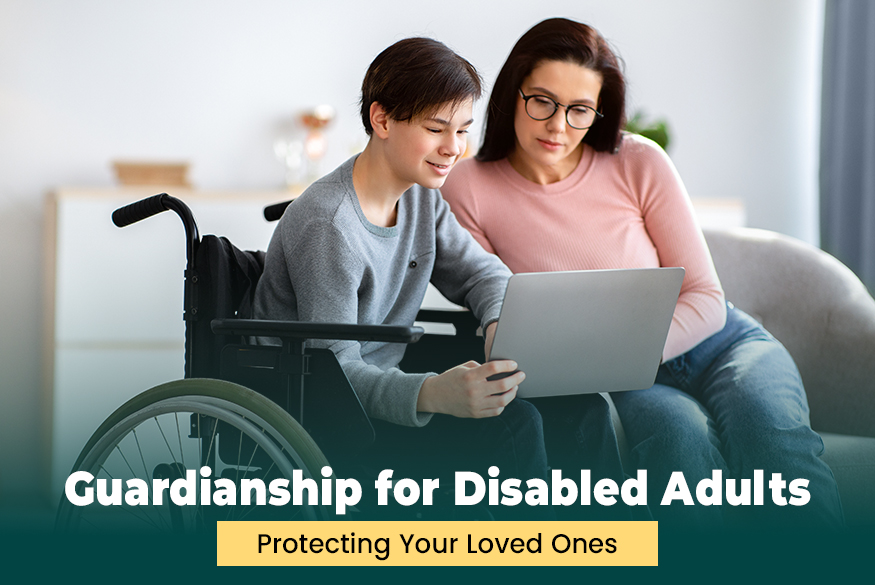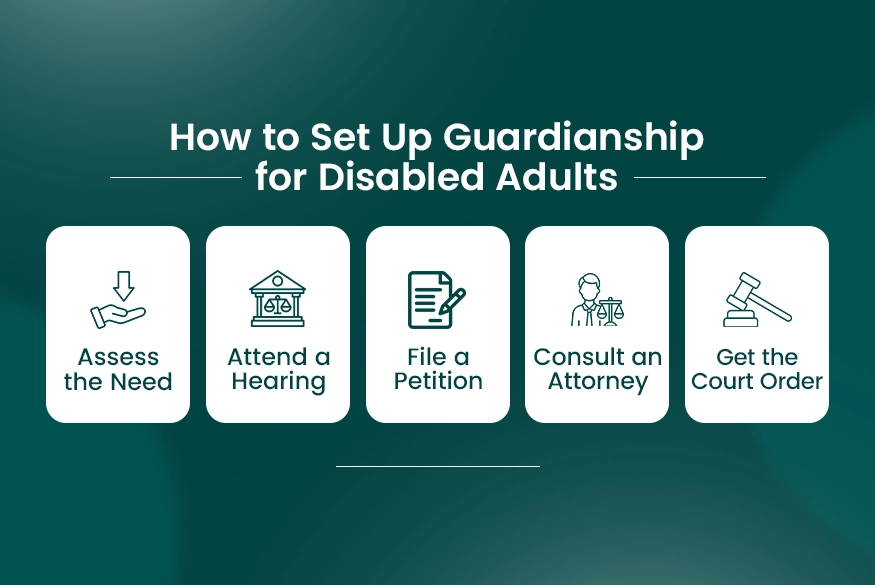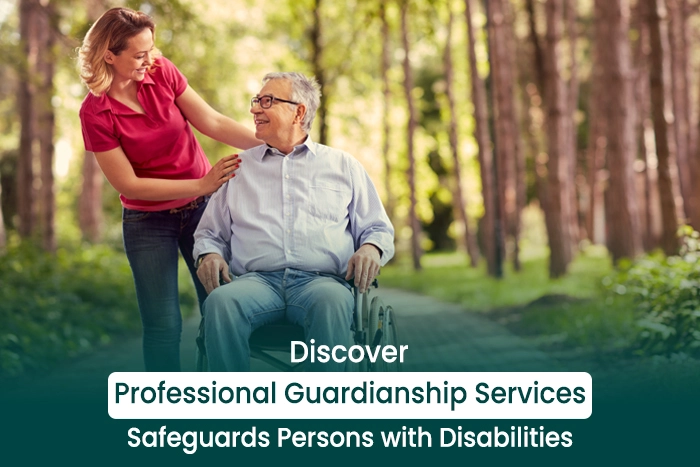![]() Mon-Fri: 8am to 5pm
Mon-Fri: 8am to 5pm ![]() +1 321-251-2812
+1 321-251-2812 ![]() guardians@agedcareguardian.com
guardians@agedcareguardian.com

The Essentials of Guardianship for Disabled Adults: Protecting Your Loved Ones
Imagine a sunny afternoon in a quiet neighbourhood. A woman named Sarah sits on her porch, sipping tea and watching her son, Timmy, play in the yard. Timmy is 17 years old and has a developmental disability. As Sarah smiles, she also feels a bit anxious. She knows that soon, Timmy will turn 18, and with that birthday comes a big change. Suddenly, she realises she will no longer be his legal guardian. Who will make decisions for Timmy?
Sarah’s story is one many parents share. When a child reaches adulthood, parents often worry about what lies ahead. For this reason, guardianship for disabled adults becomes crucial.

First Thing First, What is Guardianship?
Guardianship is a legal way to make sure someone can help a person who can’t fully care for themselves due to a disability, illness, or other challenges. A guardian can help with decisions about health care, finances, and daily living.
In many places, when a child turns 18, they are considered adults. Parents lose their automatic right to make decisions for them. This is because guardianship is crucial for adults with disabilities.
Why You Might Need Guardianship:
Not every adult with a disability needs a guardian, but it’s something to consider. Some adults can make their own choices. Others might need help managing their daily lives. If your loved one struggles with decision-making or handling money, guardianship might be the best option.
There are different types of guardianship:
- Guardianship of the Person: This means the guardian helps with personal decisions like health care and living arrangements.
- Guardianship of the Estate: This focuses on financial matters, like managing money and paying bills.
- Limited Guardianship: This means the guardian only has specific powers, while the person keeps some rights.
How to Set Up Guardianship for Disabled Adults:

Setting up guardianship for a disabled adult can seem complex, but it doesn’t have to be. Here’s a simple process to follow:
- Assess the Need: Talk to your loved one and other family members about whether guardianship is necessary. Consider their abilities and needs.
- Consult an Attorney: It’s best to seek advice from a lawyer who understands guardianship laws in your state. They can guide you through the process and help you fill out the necessary forms.
- File a Petition: This is the official request to the court to become a guardian. You’ll need to explain why guardianship is needed.
- Attend a Hearing: The court will schedule a hearing to examine the petition. You may need to provide evidence and answer questions.
- Get the Court Order: If the court approves your petition, you’ll receive a court order that officially grants you guardianship.
Choosing the Right Guardian:
If you’re considering guardianship for your loved one, think carefully about who should be the guardian. Often, it’s a parent or close family member.
Ensure that the guardian you choose is reliable and dependable. It could also be wise to select a backup guardian, in case the first choice can’t fulfil the role.
Creating a Guardianship Plan:
Once guardianship for a disabled adult is established, it’s important to create a plan. This plan should cover everything your loved one needs.
Here Are Some Important Points To Consider:
- Living Arrangements: Where will they live? Will they need assistance at home?
- Medical Care: What healthcare do they need? Who will make medical decisions?
- Financial Planning: How will their money be managed? Think about establishing a Special Needs Trust to safeguard assets.
Guardian Advocacy in Florida:
In Florida, a guardian advocate is a unique type of guardianship designed specifically for individuals with developmental disabilities. It offers a less restrictive alternative to traditional guardianship, allowing individuals to maintain some level of autonomy while receiving support in areas where they need it.
Who It’s For:
Guardian advocacy is intended for adults with developmental disabilities, such as intellectual disabilities, cerebral palsy, autism, spina bifida, or Prader-Willi syndrome. The disability must have manifested before the age of 18 and be expected to continue indefinitely.
Purpose:
The purpose of guardian advocacy is to provide support and assistance with decision-making for individuals who may lack the capacity to make some, but not all, decisions necessary for their personal care or property management.
Less Restrictive:
Unlike full guardianship, where an individual is deemed incapacitated, guardian advocacy recognizes that the person may still have the ability to make certain decisions.
Powers and Duties:
The court grants specific powers to the guardian advocate, tailored to the individual’s needs. These powers may include:
- Making medical decisions
- Managing finances
- Accessing government benefits
- Making educational or residential decisions
Process:
To establish guardian advocacy, a petition is filed with the court, and a judge decides whether to appoint a guardian advocate based on the individual’s needs and circumstances.
Benefits:
- Maintains Independence: Allows individuals to retain some control over their lives.
- Provides Support: Offers necessary assistance and protection.
- Less Stigmatizing: Can be perceived as less restrictive than full guardianship.
Key Differences from Full Guardianship:
- Capacity: Guardian advocacy does not require a finding of complete incapacity.
- Scope: The guardian advocate’s powers are limited to specific areas defined by the court.
- Flexibility: Guardian advocacy can be tailored to meet the individual’s changing needs over time.
If you’re considering guardian advocacy for yourself or a loved one, it’s important to consult with an attorney who specializes in guardianship law. They can help you understand the process, your rights, and ensure the best outcome for the individual involved.
Bottom Lines:
Guardianship for disabled adults is crucial. If you’re unsure where to start, reach out to The HARTAGE FOUNDATION INC. Whether you need legal advice, court representation, guardian advocay or elderly guardianship for the disabled persons in Florida – we can guide you every step of the way. We can assist you in setting up Special Needs Trusts, Medicaid planning, and other financial strategies.
You can also go through our book ““Family & Professional Guardianship” to get practical solutions grounded in law and factual insights.


